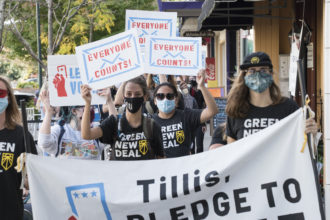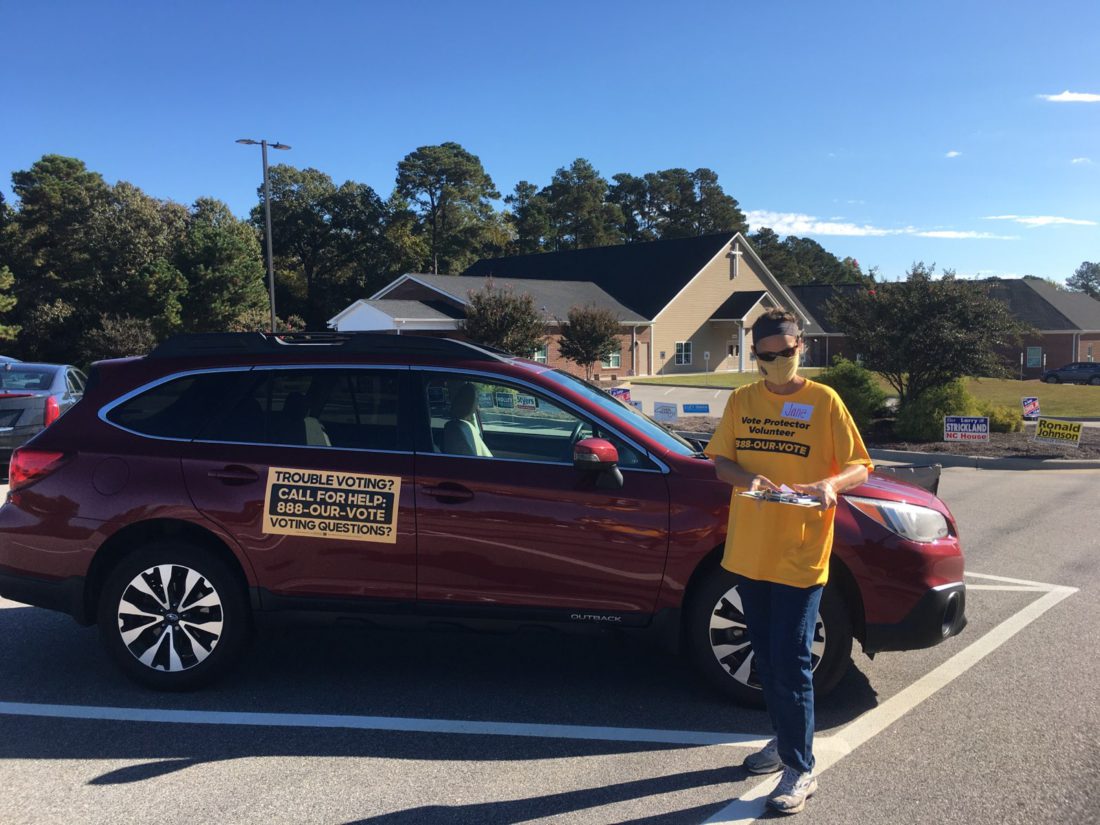Of all the ways to defend democracy, poll monitoring is among the least glamorous. Those who sign up stand watch at community centers, churches and schools across the country, clipboards in hand, making sure that elections officials, candidates and outside groups alike follow the rules. It’s a role with long hours, no pay and, if everything goes as it should, little excitement.
But in 2020, more people are excited about the job than ever before. Over 2,000 North Carolina residents have volunteered as nonpartisan poll monitors through Democracy NC, including around 300 in Western North Carolina. That’s nearly twice the 1,100 monitors the Morrisville-based nonprofit deployed in 2016, says Edward Peters, the group’s WNC regional managing organizer. Many, he adds, are signing up for the first time.
“This year feels a little different,” Peters says. “There seems to be a really heightened sense of what could happen, what might happen, and how to respond to that.”
Democracy NC volunteers aren’t the only ones who think so. Local governments, political parties and activists throughout WNC are all gearing up to protect an election challenged both by the COVID-19 pandemic and concerns over the integrity of the process.
As of Oct. 26, nearly 3.2 million votes had been cast across the state through mail-in and in-person early voting, according to the nonprofit Civitas Institute’s VoteTracker. Those watching the election say they haven’t seen anything out of the ordinary thus far — but they’re leaving as little as possible to chance.
Eyes wide open
Per North Carolina state law, independent poll monitors don’t have an official legal status and must stay outside the marked buffer zone (usually 50 feet) that surrounds each polling site. Nevertheless, Peters says volunteers can play an important role in ensuring that no voter is unlawfully turned away.
For example, monitors can ensure that voters with disabilities have access to curbside voting, inform voters about their right to a provisional ballot if they go to the wrong precinct on Election Day, remind people that no voter ID is required and relay concerns about long lines or faulty equipment to the proper authorities. Democracy NC volunteers also promote the 888-OUR-VOTE voter information hotline, which received over 1,100 calls on the first day of early voting alone.
Peters notes that Democracy NC is deploying some volunteers to WNC locations that community members have flagged as potentially problematic. Recent protests over a Confederate monument in Sylva warranted poll monitors at Western Carolina University, while a history of challenges to Mars Hill University students means more watchers will go to Madison County.
In contrast, political parties have the right to watch elections from inside polling places. State law allows officially appointed observers to take notes and raise concerns with the chief judge of each site, although they may not speak with voters themselves.
Jeff Rose, chair of the Buncombe County Democratic Party, says “a higher level of enthusiasm” among party members has allowed him to appoint observers for nearly every early voting site; in previous years, only a few roving observers cycled among sites to check for issues. “We’re looking to make sure, with all the changes in election law over the past few years, that all voters are being asked the right questions and being given opportunities to vote,” he says.
And Jerry Green, Rose’s counterpart in the Buncombe County Republican Party, says the local GOP likewise has enough volunteers to cover the county. “All we’re looking for inside is just to be sure the procedures are being followed,” he explains. “It’s been my experience, if you have Democrats and Republicans [watching], 99.9% of them want it to be honest and fair.”
Both party chairs note that their early voting observers are reporting few problems. “So far, it’s been no different than 2016 and 2018,” Rose says.
Up the chain
But beyond the official conduct of elections, says Peters, many Democracy NC volunteers are also worried about voter intimidation outside the polls. The campaign of Republican President Donald Trump has used militaristic language in calling for an “army” of poll monitors, and the president himself directed the Proud Boys, a white supremacist group, to “stand back and stand by” during a Sept. 29 debate.
“If it’s something with an armed person or a group of armed people, we’re not asking our volunteers to intervene with them, because they could potentially escalate a volatile situation,” Peters notes. In such cases, poll watchers are being directed to contact law enforcement.
As noted in an Oct. 9 memo from the N.C. State Board of Elections, interfering with an election is a Class 2 misdemeanor under state law, while both state and federal law classify voter intimidation as a felony. The memo also states that “it is not appropriate or permissible for law enforcement to be stationed at a voting place,” given that some voters may regard that presence as intimidating in itself. Enforcement of voting law is thus complaint driven.
The Henderson County Sheriff’s Office is preparing to respond quickly should any issues arise at the polls, says Maj. Frank Stout. Officers are personally connecting with chief judges at each voting precinct to set up lines of communication; Stout notes that all deputies will be in plainclothes unless answering a call for service.
Aaron Sarver, spokesperson for the Buncombe County Sheriff’s Office, likewise says that no uniformed officers will be present at polling locations. While he declines to provide further details about the BCSO’s planning, he emphasizes that “we will be ready to work with Election Services as needed.”
Higher on the law enforcement ladder, U.S. Attorney Andrew Murray of the Western District of North Carolina is encouraging residents to report concerns over intimidation or other voting rights violations to federal authorities. Contacts include Assistant U.S. Attorney Richard Edwards at 828-271-4661, the local FBI field office at 704-672-6100 and the federal Civil Rights Division at 800-253-3931 or civilrights.justice.gov.
Calm before the storm?

Local examples of voter intimidation this election season have been hard to find. Some politically motivated violence has taken place throughout WNC: A supporter of Republican House candidate Madison Cawthorn had his Jeep’s windshield broken by a thrown water jug during a “Republican ride” on Oct. 18, and the Henderson County Republican Party headquarters was vandalized on Oct. 9. Officials with both major parties say thousands of yard signs in support of various candidates have been stolen.
But little of that apparent aggression has carried over to the election itself. The only notable incident to date in Buncombe County involved verbal intimidation of voters dropping off absentee ballots by two carloads of “anti-abortion activists” on Sept. 23. As of Oct. 23, county spokesperson Kassi Day said chief judges at Buncombe early voting sites had filed no incident reports.
Alex Lines, however, believes the worst is likely yet to come. As Asheville hub coordinator and North Carolina electoral organizer for the Sunrise Movement, a nonpartisan youth climate justice group, she’s been encouraging volunteers to gain “nonviolent direct action and deescalation skills” in preparation for election season. The statewide Sunrise organization hosted a training on those skills in Greensboro on Oct. 24.
Lines cites a report prepared by the bipartisan Transition Integrity Project, a planning exercise conducted in June by former government officials and other political experts, which projects significant civil unrest in any scenario but a clear win by Democratic presidential nominee Joe Biden. As previously reported by Xpress (See “After the end,” Oct. 21), although North Carolina will likely be able to report the vast majority of its votes on election night, other states may be delayed in counting large numbers of absentee ballots and won’t have final results until later in November.
“We’re not planning for this because we’re excited about it. Most of us are very, very scared,” Lines says. “But we’re preparing for the worst, just so that we can keep each other safe and try to deescalate dangerous situations.”
Both Buncombe and Haywood officials say they’ve explicitly considered civil unrest as part of tabletop planning exercises for the election, a step beyond their previous planning efforts. Buncombe’s scenario included “reports of violence breaking out in Weaverville and Black Mountain,” while Haywood’s involved crowds of supporters from both major parties gathering at multiple polling places on Election Day and “making threats along with some participants possibly armed.”
Neither county was willing to share details about how their response might be conducted. “It’s kind of like playing poker and showing your hand,” said Jeff Haynes, chief deputy of the Haywood County Sheriff’s Office.
Haynes instead urged residents across WNC to keep the peace as voting continues. “Be mindful of everyone and allow each and every person to enjoy their constitutional rights in a safe manner,” he said. “Be cognizant of that and be respectful.”




Before you comment
The comments section is here to provide a platform for civil dialogue on the issues we face together as a local community. Xpress is committed to offering this platform for all voices, but when the tone of the discussion gets nasty or strays off topic, we believe many people choose not to participate. Xpress editors are determined to moderate comments to ensure a constructive interchange is maintained. All comments judged not to be in keeping with the spirit of civil discourse will be removed and repeat violators will be banned. See here for our terms of service. Thank you for being part of this effort to promote respectful discussion.